#like how do you romanticize the horrors while ignoring them while also depicting characters accurate to canon shaped by said horrors
Text
was reading a gofushi fic the other day and it was so uncanny like the undercurrent of grooming was there very clearly but the narrative refused to acknowledge it? and even if it did it was guised as something romantic or silly. remember that time i raised you and now your romantic affliction is a reflection of my own tastes? silly of us colleagues on equal footing. and then the scene would just move on as if i hadn't just read a 2 sentence horror story. as if the grooming was a mundane part of the backstory/meet-cute as relevant as idk hair color. which is kind of slay actually. schrodinger's grooming up in here
#don't ask me for the sauce i was reading in incognito because i thought it wouldn't be a good fic#however it surprisingly was well written#but now i can't remember the title and i used a bunch of extremely specific yet random filters to find what i wanted#then read a modern au from the same author where gojo was still a teacher & megumi very seriously asked him whether he fucked his students#not because he thought it was an ethical issue he was just jealous/insecure i think? again minute slay#anyway to which gojo replied no never! but my tastes do run a bit younger :) moving on#like!!! is anyone seeing this?? much like reading the actual manga#this is a configuration i like to believe d/estiel writers have to work with#like how do you romanticize the horrors while ignoring them while also depicting characters accurate to canon shaped by said horrors
7 notes
·
View notes
Text
Across the Universe Divide: A Futuristic Worldbuilding Project
Across the Universe Divide (AtUD) is a project where I showcase my creativity and passion for worldbuilding in a futuristic setting. The project has undergone a lot of transformation and growth over time, starting from a single star system and gradually spreading to cover the entire Orion Arm of the galaxy, with twenty one different star systems and countless planets and moons.
I don't like to confine my work to a specific category or label, as I find them too limiting and restrictive. I think they can be useful for other people to discover what they are interested in, but for me they are not very helpful, as I often change and refine my vision as I work on it. So I guess AtUD could be loosely called science fiction, since it deals with space exploration and advanced technology. But it is also influenced by other genres, such as speculative fiction and alternate history, as I imagine different scenarios and outcomes for humanity and other civilizations in the galaxy.
I am not a fan of the hard-soft sci-fi scale that some people use to rate works of this genre. Again, I think it can be a useful tool to filter what you like and what you don't, but it also seems to create a lot of unnecessary arguments and debates. In this project, I am more focused on creating interesting themes and stories than on being scientifically accurate, although that doesn't mean I ignore research or logic. As the creator, I have my own criteria and limits for what I can suspend my disbelief and accept, which may differ from others. Space is awesome, but I don't want to get bogged down by the technical details and calculations, that's not my interest. So the way I approach this is to use what I think is plausible and coherent within my setting and build on that. So yeah, I don't really care what others call it, as I know everyone has their own opinions and expectations from different genres.
Some of the themes that I explore in this project are those that fascinate me on a personal level, such as geopolitics, history, religion, occultism and mysticism. I also draw inspiration from different genres and styles, such as military sci-fi, political science and ideology, cosmic horror, literary romanticism, and the clash between traditionalism and progressive modernity. I explore how these themes affect the characters, societies, and events in my setting, as well as their faith and human nature. These are similar themes that I also use in my fantasy worldbuilding project “the Black Book of Arkera”, which shows my consistent interests and preferences. Some may think that these themes are too diverse and random, but I am confident that I can weave them together in a way that makes sense and creates a unique and coherent vision.
One key aspect of the setting is the lack of aliens, at least in the traditional sense. When writing fantasy, I always had a difficult time writing non-human races, as only a few authors ever managed to do this in a way I found intriguing. Most non-human races usually just end up personifying one aspect of humanity taken to an extreme, which I find boring and unoriginal. Why do that when you can just use humans? In AtUD, humans have been seeded across the galaxy by an ancient civilization known as the Builders, who have mysteriously disappeared. Humanity exists on a multitude of planets throughout the cosmos, giving plenty of opportunities to create unique cultures and speculate how various environments affect them. My main problem with the way most alien races work in sci-fi is that they are so monolithic. On Earth, there are hundreds of cultures, but aliens are often depicted as having a simple monoculture. There is no reason to think they would be any different than humans. The scope of writing aliens to be so detailed is likely very daunting and perhaps this is why it is not done. With that said, while there are no aliens per se, there are forces that exist beyond mortal comprehension, supernatural forces if you will. These forces are just a hint at the complexities and mysteries of the universe. Humans are at the center of a great game where powers beyond imagination use them as pieces on a board in the great struggle between light and dark, life and death, good and evil.
0 notes
Note
Never seen the musical Hamilton (big fan of Daveed Diggs though), but I saw someone go off on how terrible he was. How the musical glories a slave owner and all that. How should we go about telling stories of our history The musical is mostly POC and seeks to retell this story for a modern audience. Is that right? Should we glorify our founding fathers who were kind of shitty people. Or do we support this reinterpretation by the very minorities who weren't even considered human back then?
People tend to use the term “glorify” and the similar “romanticize” without understanding what those words mean. They’re used as catch-all terms for “Thing I don’t like” because it’s understood that (like “problematic”) they’re hot-button words that immediately make people wary. That’s the point. If you say, “Hamilton romanticizes slave owners” that sounds so damning that most people will accept the argument at face value. Those three words do the work for you because if a story is romanticizing/glorifying a Bad Thing or the story is just all around problematic... I don’t want to be the one to defend that. Those terms are useful for shutting down conversations before they’ve even begun.
Thing is though, Hamilton doesn’t romanticize the founding fathers. To romanticize/glorify something is to present it as unjustifiably good, to idealize it unrealistically and work to make it more appealing than it actually is. That doesn’t happen in Hamilton. Putting aside the work Lin did reclaiming that history and retelling it for a cast made up almost entirely of people of color, the story itself acknowledges all the flaws these men had, including the horrors of slavery. Though not the centerpiece of the show, it’s far from ignored. Laurens is working to end slavery. There’s a refrain about “Are we free?” as it applies to the war and the answer is continually “No” because others are still enslaved. Jefferson’s perception that he “can’t believe that we’re free” is looked down upon. He’s explicitly called out by Hamilton in the cabinet battles, reminding the audience that most of his holier than thou attitude stems from the boost slavery gave him:
A civics lesson from a slaver, hey neighbor
Your debts are paid 'cause you don't pay for labor
“We plant seeds in the South. We create.” Yeah, keep ranting
We know who's really doing the planting
That’s in no way romanticizing! Despite how staggeringly negative this is, some people seem to want a heavy-handed disclaimer. Like Lin should pause halfway through the show, speak directly to the audience, and go, “Hey, everyone. I just wanted to take a moment and remind you that slavery is, in fact, very bad. I know the show has been sending that message from the get-go and that we’re a cast of those most impacted by that legacy, but just in case it wasn’t clear: none of us support that the founding fathers did this.”
The founding fathers were absolutely shitty people. You know what’s beautiful about Hamilton? It shows them being shitty people. I could give you a laundry list of times in the show where they’re depicted as both flawed and truly horrible. Again, not glorifying. The viewers may choose to glorify them in fic/art/conversations/etc. despite all the work Lin did, but that’s not the fault of the show. It’s likewise not his fault if people are unable to tell the difference between romanticizing and acknowledging accuracy. Meaning, real life isn’t like a cartoon. The bad guys we see around us - like the founding fathers - are not going to be mustache-twirling horrors with no redeeming qualities because we find that simplicity comforting. Evil people are charismatic. They’re intelligent. Witty, humorous, kind to so many others provide they’re the “right” kind of person... Writing Thomas Jefferson as the kind of guy you might want to be friends with isn’t romanticizing, it’s accurate. And it’s really important to acknowledge that. Racists aren’t villains hiding out in some super evil lair just waiting to commit hate crimes. They’re the friend you grew up with and love to death... who is also now going to Trump rallies. It’s your brother who is great to you but talks shit at the dinner table every night. It’s your upstanding boss, pillar of the community, beloved by all... who is using that power to get away with heinous things. It’s important to acknowledge - and teach - that this is what racism looks like and it’s something Hamilton does beautifully. Part of the point is to create that discomfort. The feeling of, “Wow! I love Jefferson in this. He’s so cool, charming, funny and - oh fuck yeah he’s got slaves, shit.” Because that’s what real life is like. The racists aren’t going to come out on stage spewing their rhetoric so you understand precisely how horrible they are from the get-go and never, ever have to acknowledge that there are parts of their personality you really like. They’re the Thomas Jeffersons of the world: charming you in the morning and raping his slave at night.
To acknowledge that isn’t glorifying him. Hamilton the story is explicitly anti-slavery while likewise acknowledging that the founding fathers were complex human beings who, yes, achieved some great things even while they did other, truly horrific things. To deny that is to teach that racists aren’t anything like that person in your life who also did this great thing... even though they are. Hamilton didn’t shy away from that and it’s a story that expects a certain level of critical thinking from its audience. Frankly a pretty low bar of, “We’re a group of minorities forcibly taking this narrative for ourselves and using it to comment on these issues... that is in no way the same thing as glorifying those issues.” It’s basically fanfiction with Lin (the fan) taking an incredibly offensive canon (history) and going, “I’m going to reclaim this as best I can without, you know, totally erasing what I was given.” It’s also like fanfiction in that it is fiction. Hamilton takes a great many liberties with history because that’s what art does. It’s not a textbook. To claim that anyone who enjoys the Hamilton version of Thomas Jefferson is a bad person is like saying you’re a bad person for liking Darth Vader, or Hannibal, or any other bad guy given a sympathetic twist. The acknowledgement, “Just because I like this horrible person in a story doesn’t mean I agree with them...” applies to Hamilton too. We’re not discussing the historical figure here. We’re discussing a semi-fictional amalgamation Lin created for a broadway show.
Is Hamilton perfect? Of course not. No story ever is and if we tear all two hours and forty minutes of it apart we’ll undoubtedly find something objectively “problematic” because that’s just how creating art works. But overall I think the show did an excellent job of getting its - complicated - messages across. Those who are #cancelhamilton aren’t paying attention to what Hamilton is: a reclaiming of white supremacy, a commentary on the malleability of narratives (that is, what narrative does America normally spout about how great this country is?), and an acknowledgement of the complicated face of racism - among other things. Again, if people are reducing that to “You made me like a slave owner character therefore you’re romanticizing him” that’s not the fault of the text.
145 notes
·
View notes
Text
American Horror Story Hotel: A Rant Continued
Yesterday I posted my thoughts on AHS: Roanoke, because it was terrible and all my anger was eating me up inside. I thought that would be the end of it, but I was wrong.
@colonelcaribou was curious as to my thoughts on Hotel, and so I’m here to present you with more ranting about American Horror Story (something that I’m always more than happy to do, by the way.)
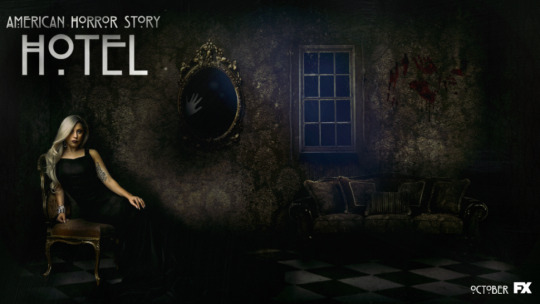
SPOILER WARNING: Like my last AHS rant, this is intended for people who have already seen the season in question, this time Hotel.
Let’s just go ahead and start this off with one of my favorite things; unpopular opinions. Hotel is actually my personal favorite season of American Horror Story. While I don’t think it’s as good as Murder House from a critical standpoint, the strengths from the season all play to my preferences whereas the weaknesses are issues that I seem to have with every season of the show - making it the most enjoyable for me to watch. That being said, it’s the only season (excluding Roanoke) that I’ve only seen one time, and I’m probably the least familiar with it.
While it is my favorite season - it’s far from perfect. Since this is a rant, I’m going to start by talking about the things that drove me crazy.
I think one of the aspects that bothered me most throughout the season was Chloë Sevigny’s portrayal of the grieving mother Alex Lowe. I can see where she was going with the role, the under-played emotions were meant to illustrate the detachment and depression that her character is experiencing (at least, that’s what I got out of it.) However, it led to me feeling like many parts of the story regarding her character were bland at best. The fact that the only real emotion I remember her distinctly expressing was anger (which was often misguided, misplaced, or exaggerated) tipped the scales toward me actively disliking her character. This was a big issue that I had with what was an otherwise great subplot.
Before I move away from the Lowe family too much, it’s also worth nothing that I took issue with some character design choices for the small son, Holden Lowe. This sounds like nitpicking, and maybe it is, but could they have made the kid any creepier? It would be one thing if that was part of the story all the way through - or if they had made him look more like a normal kid in the flashbacks at least, but I actually found it really distracting. With the long, wispy, white blond hair, the pale skin, and his mother’s vacant expression - this kid was legitimately the most terrifying part of the season in my opinion, and it kind of sucks that I don’t think it was intentional.
Now let’s talk about James Patrick March.
Don’t get me wrong, I thought he was an interesting character. His design was great, Evan Peters did a fantastic job playing him, but his name bothered me. It’s not the first time that American Horror Story has changed the name of a character or even a historical figure being portrayed on the show - and I can see why they wouldn’t want to flat out say that this character was H. H. Holmes. After all, the Hotel Cortez was an amalgamation of many different locations, and it wasn’t even located in the same state as the infamous “Murder Mansion” that Holmes built in Chicago. Using the name of the actual killer would have been spreading a wild amount of misinformation, and considering the amount of liberties they had to take with the character’s history, could have been seen as pretty insensitive.
It makes sense that they would choose a new name for him and just use Holmes as inspiration (like they did with the Briarcliff Institute in Asylum) but there was one episode where it started bother me; Devil’s Night. In a room with the spirits of the most notorious serial killers, the fact that H. H. Holmes had been replaced with James Patrick March meant that he obviously couldn’t be at the soiree, since he was, in a way, hosting it. It’s a small enough detail, but it’s one that got on my nerves while I was watching, and as I’m typing this out I realize it really stuck with me.
That small issue is also a great transition into Devil’s Night, which was my least favorite episode and, as far as I saw it, the worst part of the season.
Let’s say for a moment that I buy into the premise of serial killer ghosts having dinner together annually on the one night of the year where they have physical form on this plane (which for the record, I don’t.) Let’s also say that the ghost of not H. H. Holmes was somehow a mentor to all these serial killers from all over the country, and that somehow makes sense. The execution was still very flawed. The whole scene was over the top, the dialogue felt very forced, and what the fuck was going on with the Zodiac killer?
Like, okay, I get that we don’t have enough information to do an accurate depiction of the Zodiac killer, but I feel like there were a lot of better alternatives than to making him look like the world’s worst Monty Python and the Holy Grail cosplayer (did anyone else get that impression from his outfit, or was it just me?) Much like my issue with Roanoke where they failed to give me an answer to an actual, historical mystery that they decided to bring to screen, I feel like there were a lot of ways to go.
Zodiac could have been just a regular guy whose name wasn’t mentioned. Could have been a regular woman whose name wasn’t mentioned. They could have created a name (like they did with James Patrick March.) He could have been Ted Cruz - which would have been the best use of a meme on television. He could have, and this is crazy, not been there at all. I think that would have been my top choice, actually, because from what we do know of the Zodiac killer, what are the chances he would attend an event like that anyway? I feel like the most elegant solution to the dilemma would have been to have a place-setting at the table for him (with the symbol on it of course) and then to have slipped a line in there about how he never shows.
There were some other issues throughout the season, but these are the ones that really stuck with me, and that I’m still thinking about a year after watching it. So, with all these complaints, you’re probably wondering why this is my favorite season. Unlike Roanoke, Hotel had a lot of redeemable moments and now I’m going to transition into some more positive ranting.
For one, the ambiance was great. The set was stunning, the cinematography was gorgeous, and hands down this was the season with the best sound track. (They got my favorite She Wants Revenge song AND my favorite Eagles song in the pilot, how awesome is that?)
There was an excellent use of body horror throughout the season, from the grisly killings committed to represent the ten commandments to the flashback where Sally sews herself to her friends. I think more than any other season the visuals really stuck with me.
While I have already brought up some problems I had with certain casting decisions - there were a lot of fantastic choices also made in that regard. I was surprised by just how talented Lady Gaga was in her role as The Countess, Kathy Bates continued to impressed, I think Sally was one of Sarah Paulson’s most intriguing and well-played characters. Let’s also not forget about the amazing supporting cast in this season. While there were countless characters in the Hotel Cortez that were wonderful, I don’t think any of them stand out as much as Liz Taylor.
In addition to being beautifully designed, perfectly portrayed and having a fascinating backstory that contrasts with the darker themes in the rest of the season, Liz Taylor was possibly the best instance of representation in the season - perhaps in the entire show. While the Countess also offers some LGBTQ representation, I was deeply moved by the mature way they dealt with having a transgender character recur throughout the season.
They addressed Iris not being comfortable with Liz due to her own ignorance, and she was upfront about how she didn’t know how to ask. Liz, a strong woman confident in her identity is happy to set the record straight, even though it means sharing about a time in her life before she had that confidence.
That flashback scene also shows The Countess in a softer light as she helps Liz embrace who she was meant to be and acknowledging her as a woman before the rest of the world did. She pushes Liz to come out as a woman, and when she sees that she’s pushing too hard, tones it down and suggests a smaller, more manageable step. Maybe she didn’t handle being an ally the best, but the fact that she realized she was trying to force someone to do too much too fast and backed down showed a side of her character that was unexpected, especially considering her unflinchingly dominant personality.
Where I thought Liz really shined though, was after that when she’s in bed with Tristan. Tristan is surprised that he’s fallen for Liz because “he’s not gay.” Liz is quick to assert her gender and set him straight. “You’re not gay for being with me. I’m a girl. I’m a hetero girl.”
There’s one last big thing that made me really appreciate this season, and that was the mythology. Those of you who have been following me awhile know that I am tougher on vampire stories than I am on just about anything else. It’s partially because I got burnt out on it, but I also feel like a lot of vampire mythology is poorly executed and overly romanticized. If I had known there would be vampires in the season, I might not have even wanted to watch it - but I’m so glad I did.
There are a lot of vampire romances in Hotel, but at the same time I feel like they weren’t glorified. At no point did I feel like the show was trying to sell me on the concept of eternal love through a vampyric virus. On the contrary I think it illustrates how the undead are in many ways lonelier than they ever were as humans. The relationships aren’t born out of romance, they’re born out of the lust that comes with the vitality of everlasting youth, and that’s how it was depicted.
All in all I felt like this was a much more realistic take on vampires. They’re less idealistic and in a way the idea of vampires being more human is a lot scarier than the alternative. They’re not dangerous because they’re monsters, but rather because they have the same wants and needs that we all have, but amplified. Not only does it make the prospect of them existing more plausible, it makes the idea of becoming one much less appealing - which is exactly how it should be.
The undead (the ghosts and vampires both) were glamorous, but that beauty was always matched with such clear suffering.
I have a lot more that I could probably say about the show, and about this season in particular, but this hits most of my big points about it. While it’s not perfect, there were a lot of things that made me enjoy the story.
In fact, writing this up, I think I’ve talked myself into re-watching the season to see if it holds up.
#american horror story#ahs#american horror story hotel#ahs hotel#ahs rant#rant#ranting#american horror story rant#american horror story hotel rant#hotel rant
10 notes
·
View notes
Text
*deep breath* DOES ANYONE WANT TO TALK ABOUT THE COMIC TITLED “MANIFEST DESTINY”, NOT THE ACTUAL CONCEPT OF MANIFEST DESTINY, BECAUSE IT IS A GOOD COMIC?
*cough* Oh god. Gimme a second.
Okay. Okay. I’m good now.
So. I’ve made the terrible mistake of trying to find fans of the comic Manifest Destiny on Tumblr. One guess how that turned out NOT WELL. Had a bad time.
I figure, might as well put out an alert, raise a nautical flag above my hastily cobbled together raft out on the tumultuous barf sea that is Tumblr, hope some other poor soul will see me that we may huddle together in shared enjoyment of a thing.
BUT. If you aren‘t aware. There‘s a comic about the Lewis and Clark expedition.
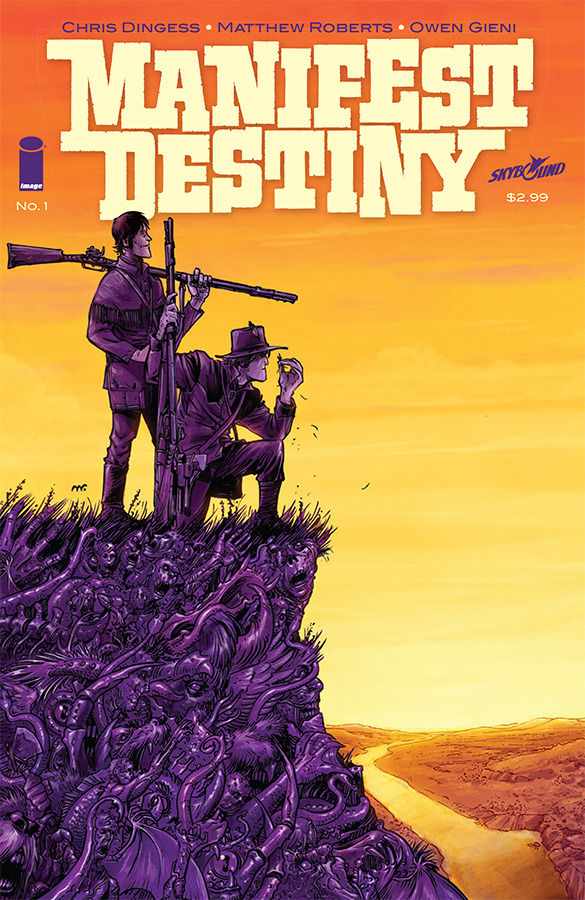
And that cover ain’t no lie* (*visually), like every other Western comic cover. That’s what the art looks like. It took me over 20 issues to realize that the coloring was digital, and that’s only because they said so in the letters section. Seriously, I need deets on how Gieni does that shit.
Of course, it stars our old friends from grade school history class, Meriwether *snicker* Lewis and William Clark...

Wait, no--
Meriwether Lewis
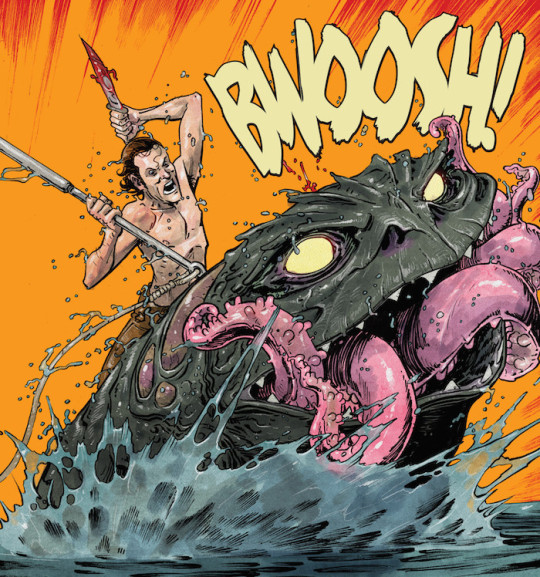
and William Clark
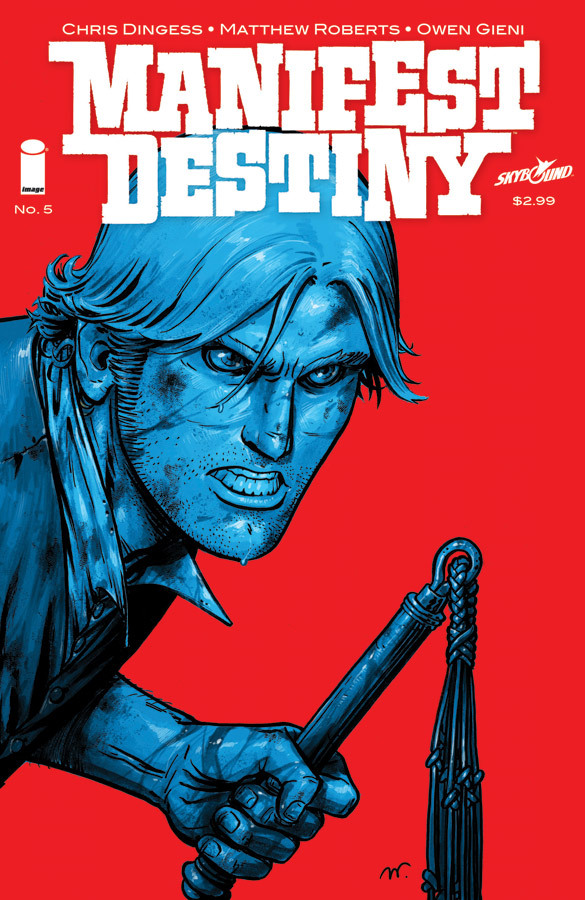
Can I get the establishing character moment, Gladys?
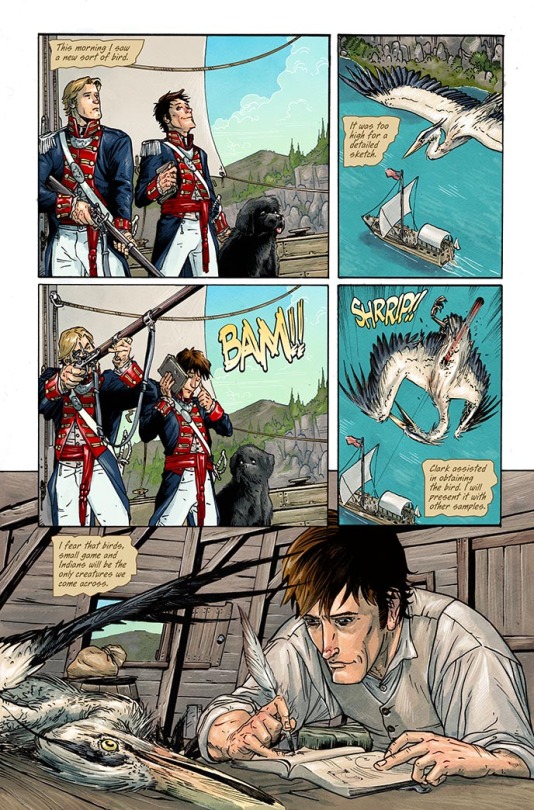
Danke. Lewis is the thinky science man and Clark is the shootsy tough guy... except when Lewis is wrestling a giant frog monster and Clark is tormented by visions of all the Native people he’s killed and... yeah. Character depth.
So don’t be fooled into thinking it’s just anther one of those “let’s take these public domain historical/literary characters and make them XXXTREME” deals that were popular a few years ago. Don’t get me wrong-- it is that, but the creators went out of there way to give it a very accurate feel...
Except for how the entire expedition was secretly a government-sponsored mission to unravel the mystery of why the North American continent is apparently filled with giant monsters and these freaky goddamn arches.

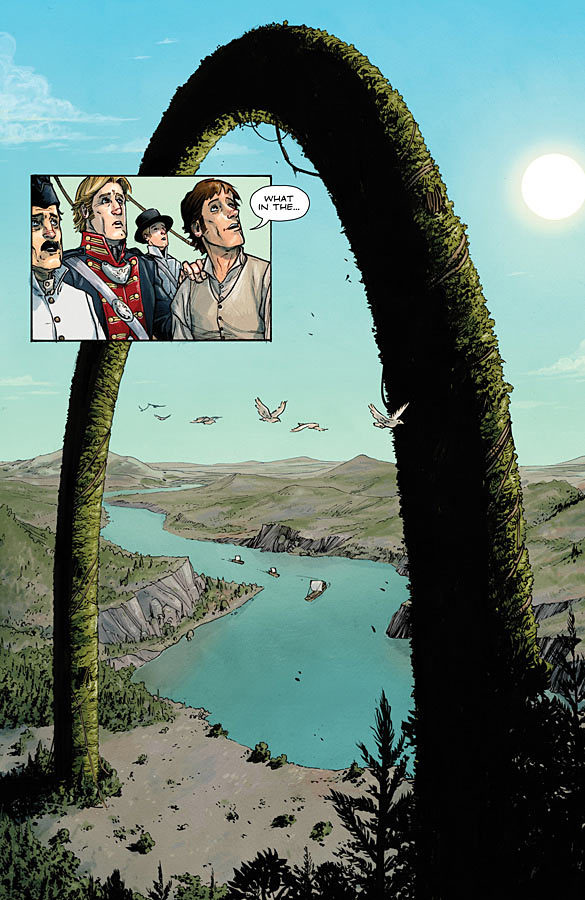
I’m now even more suspicious of the St. Louis Arch.
As far as the hictorical-characters-as-badasses factor goes, that’s primarily the domain of Sacagawea, who, in addition to still being a badass as she was in real life, is also now a badass warrior babe.


But don’t worry: there’s a reason why this teenage girl is now a world class ass-kicker (aside from growing up in an alternate universe where giant monsters are a thing)... I just can’t tell you what that is. She’s shown to have undertaken some mysterious training as a child, you know, the kind where it’s really questionable whether your teacher cares if you live or die. You know-- that kind. However, they’ve been real cagey about the wherefores of it all. What I’m saying is, although she seems like your stock stoic badass warrior chick, there’s a lot going on with her just under the surface.
And because I know you’re worried, the creators have gone out of their way to portray Native Americans as diverse human beings belonging to many different cultures, with individuals varying as much as any white character (no Magic Forest Elf Indians here). While I’m shamefully ignorant of a lot of Native cultures, the depictions... feel pretty authentic? In that they don’t feel like your usual Wilde Weste Injune stereotypes, which implies that research was done. Like, uuhhh, that bear in the lower left has a heart line, an image found in many Native cultures-- that’s a thing I know! Of course, Apocalypto went out of its way to be entirely in the Mayan language, but then... yeah. So maybe “this one thing is accurate” isn’t a good test of overall accuracy.
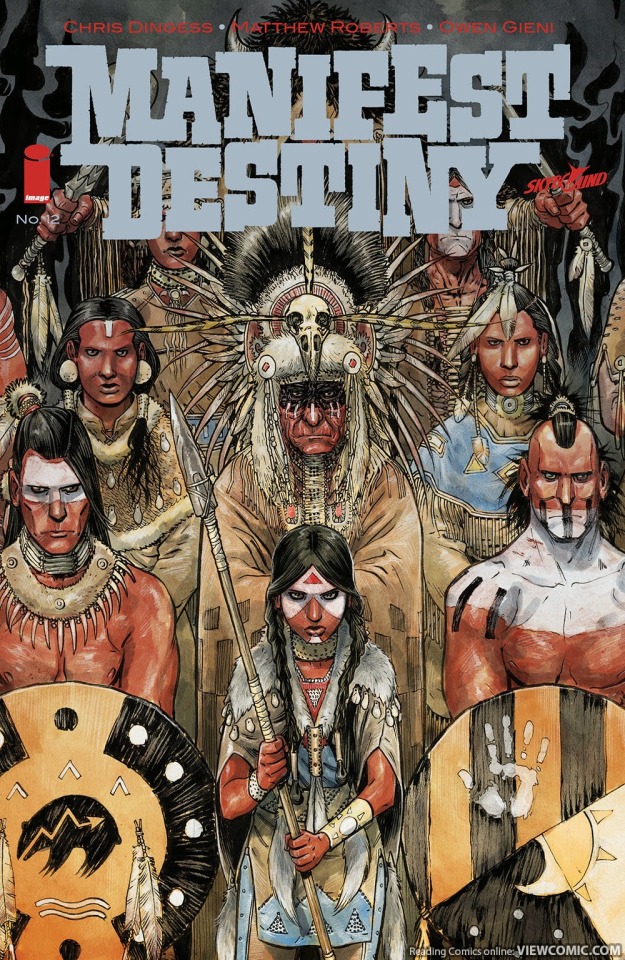

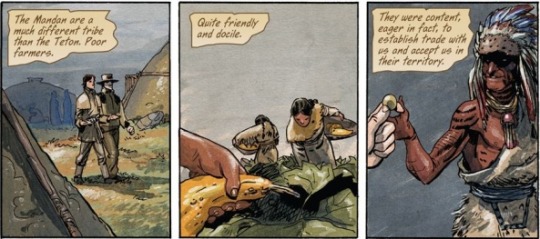
And despite being told primarily from the point of view of the mostly white expedition members, who are portrayed as... men of their time... it doesn’t romanticize history.
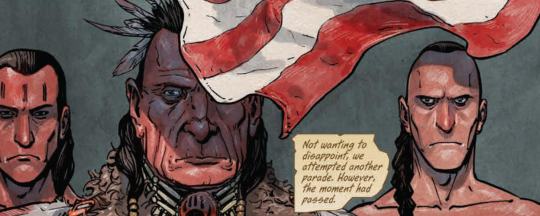
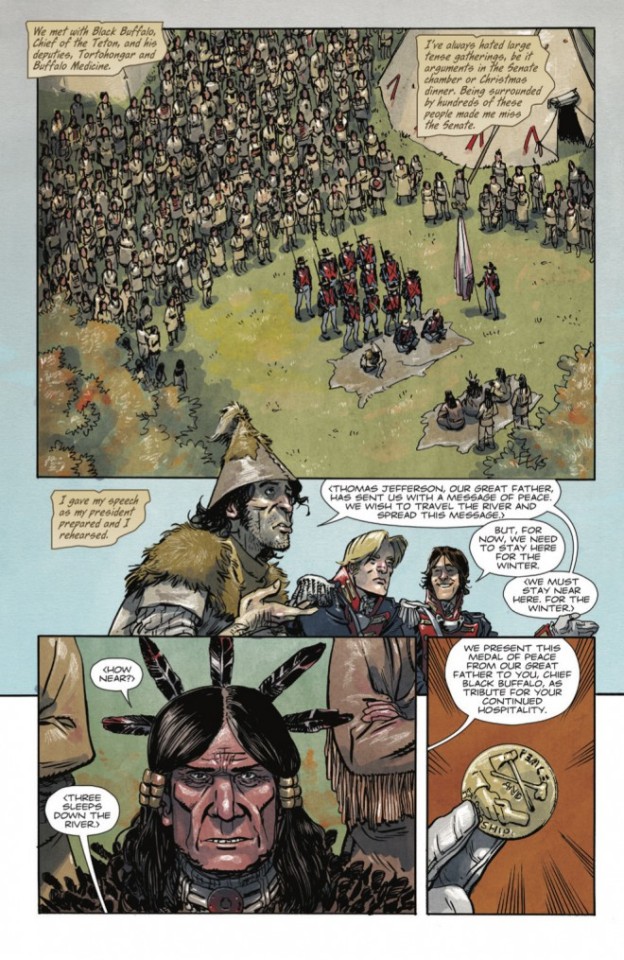
While at the same time not portraying Natives as weak, helpless victims of The Evil White Man-- who, in turn, are shown as having different opinions, with some characters being asshole racists even for the time, and others being quite progressive... for the time. Lewis is usually the one in the latter role, attempting diplomacy and gettin’ along, even if it comes off as... see above.
ANYWAY, moving on to other characters. YORK! Yet another awesome figure in history we know painfully little about and will probably never learn more about. Damn.

He got some good character development recently (as of this writing, we’re on issue 31), but I want more York being a cool dude. Like facing off with a plant-zombie bear.

Because, likely true to history, York is mostly stuck smiling and nodding at whatever the nearest white person says. But, oddly, this has taught him the art of situation-diffusing language (on top of generally being one of the more sensible and even-tempered members of the party)...
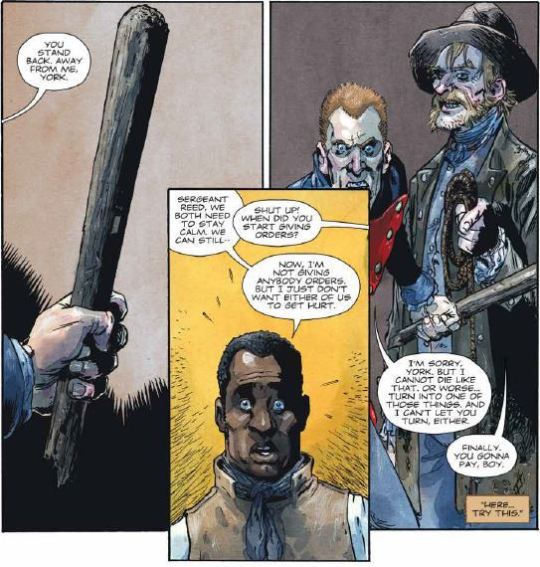
... though you can tell there are times where he’d really like to give someone a good whittling.
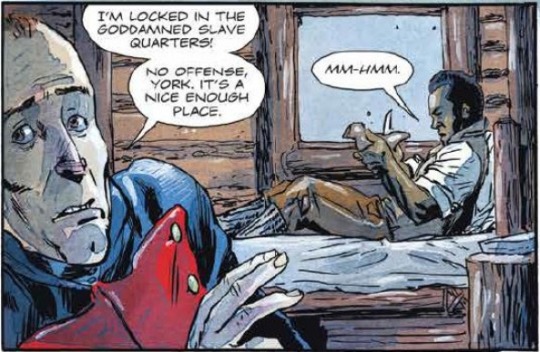
I do hope the issue of slavery comes up a bit more-- that’s another thing, they’re real good at addressing Issues without ham-fisting it. York and Sacagawea have a short conversation that I can’t find, where, if I recall, she questions his willingness to put up with this shit, and he kind of just brushes the subject off.
And I really wonder what they’re gonna do once the expedition is over, since historians are unsure whether or not Clark freed York afterwards. Because, oh yeah, all the “main characters” historically did survive, which is NUTS. You know who else survived?

SEAMAN. THE DOG. THE DOG SURVIVES. HE IS A GOOD BOY WHO DOES A GOOD JOB, 17/10, WOULD HIRE FOR FURTHER ADVENTURES.
But forever up on the chopping block is my favorite character, fictional (thus vulnerable) convict Jensen, who is a tiny weasel man who’s always talking shit (and gettin’ hit) and trying to sow discontent, because he saw through the bullshit they were all being fed about the true nature of the expedition ISSUE NUMBER MOTHER FUCKING ONE. And he survived that issue! And the next! And he’s still alive 30 issues later!
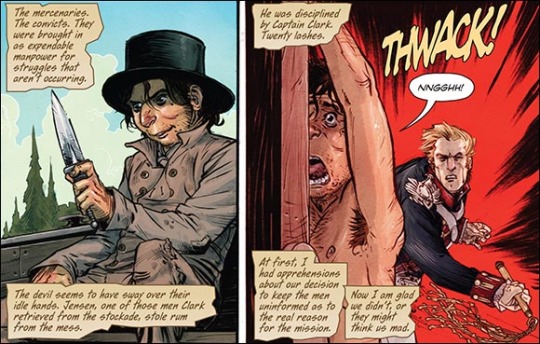
BUT ENOUGH ABOUT ALL THAT, CHECK THIS SHIT OUT!
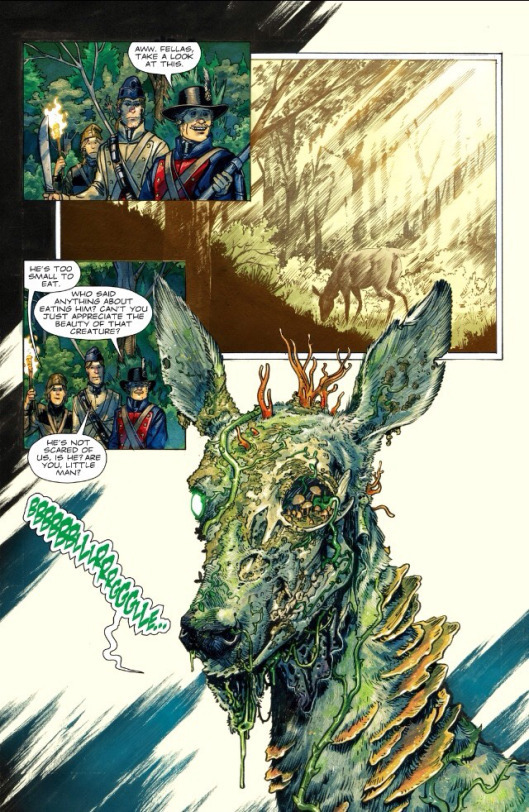
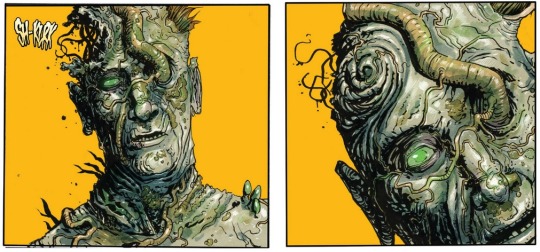
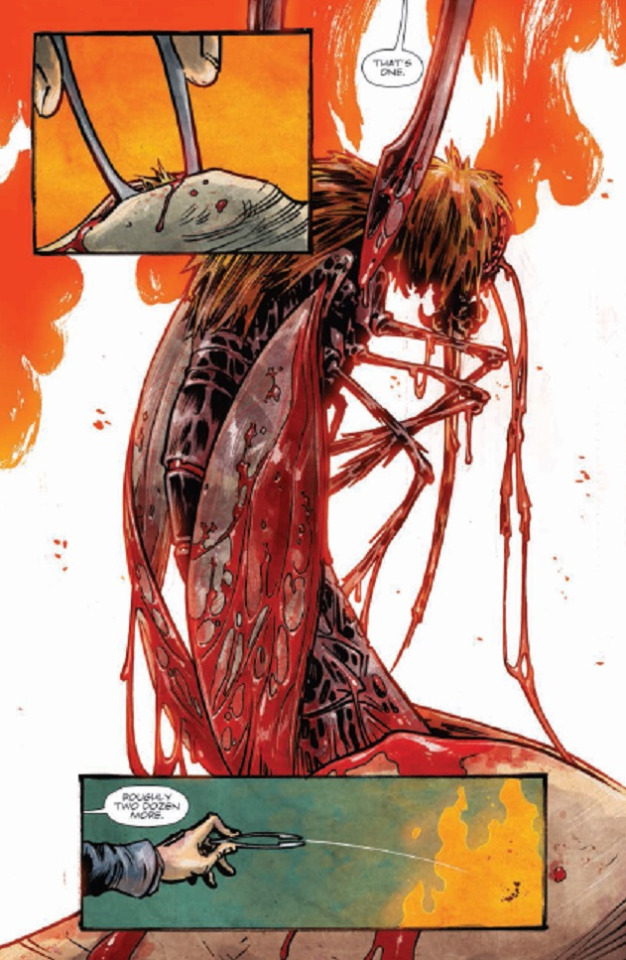


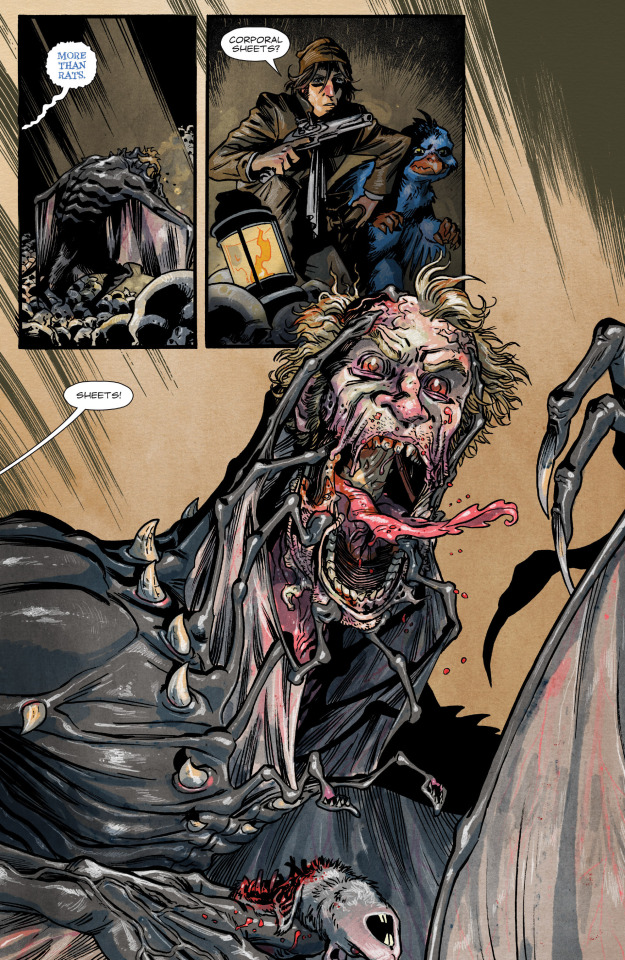


GODDAMN, this is a good looking comic. And yes, in case it wasn’t painfully obvious, it’s also a horror comic like nobody’s business.
I could go on and on and on, and I should probably put most of this behind a cut but FUCK THAT, this comic doesn’t get anywhere close to the attention it deserves, so you get to have it blasted into your eyesockets.
#manifest destiny#comics#chris dingess#matthew roberts#owen gieni#lewis and clark#history#horror#gore
3 notes
·
View notes